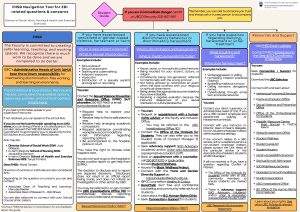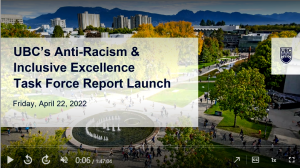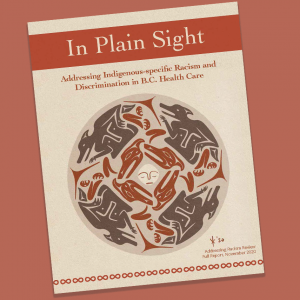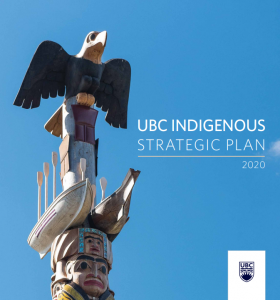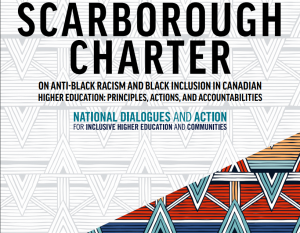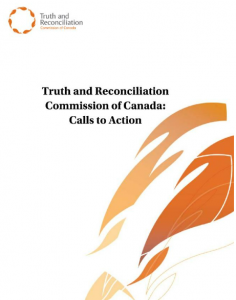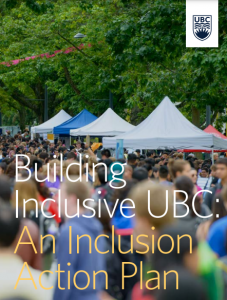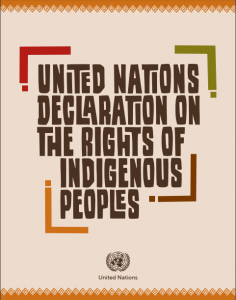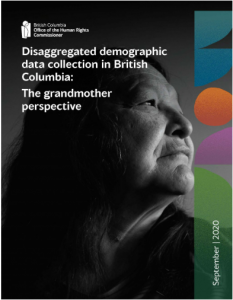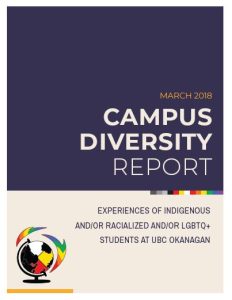Resources and Reports
FHSD’s Navigation tool for EDI related questions & concerns
This resource provides students with information on definitions, policies and EDI resources—both within FHSD and campus-wide. In creating this tool, our objectives are to minimize misinformation, retelling experiences, and time spent navigating various websites. The tool also provides information on resources of support and connection. This is an important informational tool for students, faculty and staff, please share with anyone who may benefit from this information.
Reports and Recommendations
President’s Task Force on Anti-Racism and Inclusive Excellence (ARIE) Final Report
The Anti-Racism and Inclusive Excellence Task Force convened for an intense period of work in April 2021. Its six committees representing Work and Study constituencies and Equity Deserving Racialized Groups has put forward 54 recommendations which are currently under review by the relevant stakeholder groups. The Task Force was created as part of the response to UBC’s commitment to build a more inclusive university community. The work of the Task Force was supported by the Office of the President and the Co-Executive Leads for Anti-Racism.
In Plain Sight: Addressing Indigenous-specific Racism and Discrimination in B.C. Health Care
This report is intended to explore the prejudice and discrimination experienced by Indigenous people in the health care system and to make recommendations that will help eliminate Indigenous specific racism and create substantive equity in health care experiences, services and outcomes.
Indigenous Strategic Plan (ISP) and Implementation Toolkit
The Indigenous Strategic Plan sets out a series of eight goals and 43 actions the university will collectively take in order to advance our vision of becoming a leading university globally in the implementation of Indigenous peoples’ human rights. To help guide the implementation of the ISP, the Office of Indigenous Strategic Initiatives has developed a set of tools which units can use to help situate themselves in relation to Indigenous engagement and to start aligning their work with the Plan.
The Scarborough Charter
The principles, actions and commitments outlined in the Scarborough Charter reflect our collective recognition of the realities of anti-Black racism, encapsulate our shared aspirations to address them, and provide a concrete framework for delivering on our promise.
Truth and Reconciliation Commission of Canada
The Truth and Reconciliation Commission report on the history and legacy of Canada’s residential school system. The report details 94 “calls to action” (or recommendations) to further reconciliation between Canadians and Indigenous peoples.
UBC: Inclusion Action Plan
The Inclusion Action Plan, which operationalizes the theme of inclusion, and supports the themes of innovation and collaboration in Shaping UBC’s Next Century: 2018–2028 Strategic Plan. This plan presents an opportunity for UBC to continue to develop its potential as a groundbreaking 21st century institution, including its leadership in creating global influence through its equitable, diverse, and inclusive campuses.
United Nations Declaration on the Rights of Indigenous Peoples (UNDRIP)
The Declaration is a comprehensive statement addressing the human rights of indigenous peoples. It was drafted and formally debated for over twenty years prior to being adopted by the General Assembly on 13 September 2007. The document emphasizes the rights of indigenous peoples to live in dignity, to maintain and strengthen their own institutions, cultures and traditions and to pursue their self-determined development, in keeping with their own needs and aspirations.
Disaggregated demographic data collection in British Columbia: The grandmother perspective
This report both answers and echoes the calls to collect disaggregated data to advance human rights. It emerges from decades of activism—particularly from communities of colour—calling for the data needed to develop policy that effectively addresses systemic inequalities. In other words, it calls—we call—for data that reflects the lived experiences of many, allowing their stories to be amplified and heard clearly by those in power.
Reclaiming Power and Place: Final Report of the National Inquiry into Missing and Murdered Indigenous Women and Girls
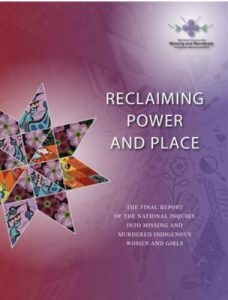 The National Inquiry’s Final Report reveals that persistent and deliberate human and Indigenous rights violations and abuses are the root cause behind Canada’s staggering rates of violence against Indigenous women, girls and 2SLGBTQQIA people. The two volume report calls for transformative legal and social changes to resolve the crisis that has devastated Indigenous communities across the country. The Final Report is comprised of the truths of more than 2,380 family members, survivors of violence, experts and Knowledge Keepers shared over two years of cross-country public hearings and evidence gathering. It delivers 231 individual Calls for Justice directed at governments, institutions, social service providers, industries and all Canadians.
The National Inquiry’s Final Report reveals that persistent and deliberate human and Indigenous rights violations and abuses are the root cause behind Canada’s staggering rates of violence against Indigenous women, girls and 2SLGBTQQIA people. The two volume report calls for transformative legal and social changes to resolve the crisis that has devastated Indigenous communities across the country. The Final Report is comprised of the truths of more than 2,380 family members, survivors of violence, experts and Knowledge Keepers shared over two years of cross-country public hearings and evidence gathering. It delivers 231 individual Calls for Justice directed at governments, institutions, social service providers, industries and all Canadians.
As documented in the Final Report, testimony from family members and survivors of violence spoke about a surrounding context marked by multigenerational and intergenerational trauma and marginalization in the form of poverty, insecure housing or homelessness and barriers to education, employment, health care and cultural support. Experts and Knowledge Keepers spoke to specific colonial and patriarchal policies that displaced women from their traditional roles in communities and governance and diminished their status in society, leaving them vulnerable to violence.
The 2021 Missing and Murdered Indigenous Women, Girls, and 2SLGBTQQIA+ People National Action Plan
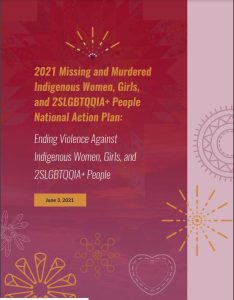 The 2021 Missing and Murdered Indigenous Women, Girls, and 2SLGBTQQIA+ People National Action Plan was co-developed by a core working group in collaboration with the National Family and Survivors Circle and contributing partners. The National Action Plan is a response to the Final Report of the National Inquiry into Missing and Murdered Indigenous Women and Girls and the Métis Perspectives of Missing and Murdered Indigenous Women, Girls and LGBTQ2S+ People and developed to drive transformative change to end systemic racism and violence against Indigenous women, girls, and 2SLGBTQQIA+ people, wherever they are. See also: The 2022 Progress Report on the National Action Plan
The 2021 Missing and Murdered Indigenous Women, Girls, and 2SLGBTQQIA+ People National Action Plan was co-developed by a core working group in collaboration with the National Family and Survivors Circle and contributing partners. The National Action Plan is a response to the Final Report of the National Inquiry into Missing and Murdered Indigenous Women and Girls and the Métis Perspectives of Missing and Murdered Indigenous Women, Girls and LGBTQ2S+ People and developed to drive transformative change to end systemic racism and violence against Indigenous women, girls, and 2SLGBTQQIA+ people, wherever they are. See also: The 2022 Progress Report on the National Action Plan
Trans, Two-Spirit and Gender Diversity Task Force Final Report
Reco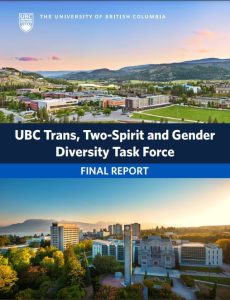 mmendations identified by the Task Force were informed by extensive consultation with the community, findings from the Gender Diversity Audit, consideration of past reports, and Task Force and community members’ expertise and lived experience. The report outlines specific recommendations related to several areas of work: 1) climate, safety, and training, 2) information systems, 3) well-being, student health and housing, 4) teaching and learning, 5) athletics and recreation, and 6) engagement with trans, Two-Spirit, and non-binary communities.
mmendations identified by the Task Force were informed by extensive consultation with the community, findings from the Gender Diversity Audit, consideration of past reports, and Task Force and community members’ expertise and lived experience. The report outlines specific recommendations related to several areas of work: 1) climate, safety, and training, 2) information systems, 3) well-being, student health and housing, 4) teaching and learning, 5) athletics and recreation, and 6) engagement with trans, Two-Spirit, and non-binary communities.
The World Professional Association for Transgender Health (WPATH) Standards of Care for the Health of Transsexual, Transgender, and Gender Nonconforming People
The overa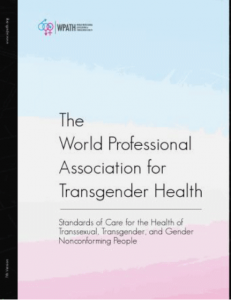 ll goal of the SOC is to provide clinical guidance for health professionals to assist transsexual, transgender, and gender nonconforming people with safe and effective pathways to achieving lasting personal comfort with their gendered selves, in order to maximize their overall health, psychological well-being, and self-fulfillment.
ll goal of the SOC is to provide clinical guidance for health professionals to assist transsexual, transgender, and gender nonconforming people with safe and effective pathways to achieving lasting personal comfort with their gendered selves, in order to maximize their overall health, psychological well-being, and self-fulfillment.
2018- Campus Diversity Report: Experiences of Indigenous and/or racialized and/or LGBTQ+ students at UBC Okanagan
The team interviewed thirty-four students who identified in one or more of the following ways: Indigenous, racialized, and LGBTQ+. They asked the students to describe how their sense of acceptance and wellbeing was influenced by the campus environment and the wider community. Students indicated many challenges: limited resources, a lack of meaningful inclusion, and the need for authentic community-building activities. The geographic region was almost uniformly characterized as socially conservative, intolerant, and ‘white.’ In contrast to the city, the campus environment was considered more accepting. However, students expressed the need for improved campus resources and practices that more effectively embraced diversity in classrooms, student services, and extracurricular programs.
UBC Policies
- Discrimination Policy (Policy SC7)
- Sexual Misconduct Policy (SC17)
- Disability Accommodation Policy (LR7)
- UBC Respectful Environment Statement
- At-Risk Behavior Policy (SC13)
- Financial Aid Policy (LR10)
- Conflict of Interest and Conflict of Commitment Policy (SC3)
- Employment Equity Policy (HR10)
- Employment Advertising Policy (HR11)
- Scholarly Academic Integrity Policy (SC6)
- Discipline for Non-Academic Misconduct: Student Code of Conduct
Legislation
- BC’s Anti-Racism Data Act
- BC. Human Rights Code
- BC Accessibility Legislation
- The Canadian Charter of Rights and Freedoms
- Canadian Human Rights Act
- BC Human Rights Tribunal
- BC Office of the Human Rights Commissioner
- Canadian Human Rights Commission
- International Decade for People of African Descent: Implementation
- Reclaiming Power and Place: The Final Report of the National Inquiry into Missing and Murdered Indigenous Women and Girls
- Statistics Canada: Police-Reported hate crime in Canada, 2018
- Statistics Canada: Impacts of COVID-19 on Canadians: Data Collection Series
- Truth and Reconciliation Commission of Canada: Calls to Action
- United Nations Convention on the Rights of the Child
- United Nations Declaration on the Rights of Indigenous Peoples
- Universal Declaration of Human Rights
Courses, Trainings, Workshops and Past Events
- UBC Project FIRE: Foundations of Inclusive and Respectful Engagement: 5 modules, raging from 1.5-2 hours each. Asynchronous modules for students to learn a foundation in inclusive and respectful engagement so they are prepared to develop discipline-specific EDI competencies and to engage with communities at UBC and beyond. Project FIRE meets the need for accessible, engaging, foundation-level equity, diversity, and inclusion (EDI) training for undergraduate students across disciplines. It has been developed by a multi-disciplinary team and is grounded in UBC’s commitment to inclusive excellence. Instructors can request access for their students by emailing Jannik Eikenaar at jannik.eikenaar@ubc.ca or Jenna Sim at jenna.sim@ubc.ca. More information in the link above (on the title of this section).
- UBC Equity, Diversity & Inclusion in Teaching and Learning: 5 Modules. Asynchronous course for instructors and anyone who is involved in teaching and learning in higher education. Learn to create a more inclusive classrooms and learning environments.
- Respect, Sincerity & Responsibility: Land Acknowledgements at UBC: 60 mins Asynchronous course for faculty and UBC employees. At the end of this session, participants will recognize why land acknowledgements are an important part of our work at UBC, identify their positionality and responsibility when offering land acknowledgements and engaging with Indigenous communities and utilize resources and educational tools.
- UBC Positive Space: Foundations: Self-Paced. Asynchronous course. The Positive Space: Foundations online course provides low-barrier access for students, staff, and faculty to learn about sex, sexuality, and gender diversity.
- UBCx Gender and Sexuality: Applications in Society: 6 weeks 2–4 hours per week. Asynchronous course. This course will teach you to better understand and apply knowledge about gender and sexuality — a critical first step in addressing social, economic and cultural inequalities.
- UBC CPD Gender-Affirming Primary Care: 60–90 mins online content. Asynchronous course. This is a short online continuing medical education course designed for primary care providers in BC. By understanding trans and gender diverse health issues and considerations for care, you will then have knowledge and skills to implement the Gender-Affirming Framework to improve the care of gender diverse patients.
- UBC CPD Curse on Gender-Affirming Perinatal Care: Safe, Respectful, and Celebratory:1 hour, online. Free. This course was designed for perinatal health care team members that are seeking to expand their knowledge on gender-affirming care. It will give you tools to make your practice safer for gender diverse, transgender, non-binary, and Two-Spirit people seeking gender-affirming perinatal care.
- UBC-CPD-Webinar-Improving-Care-for-Transgender-Patients: 1 hour recorded webinar. This webinar is meant to support those who are newer to the work, to feel more confident in their ability to care for transgender patients. Access to health care that is respectful enough for me, can have a profound impact on health and well-being of trans people.
- UBC CPD- Course on Autism and Neurodiversity in Primary Care (ASD) – Recognize and Refer: 2 hours, online. Free. Many primary care providers reported they felt ill-prepared to care for children, youth and adults with autism spectrum disorder (ASD) due to lack of training. UBC CPD has partnered with the UBC Centre for Interdisciplinary Research and Collaboration in Autism (CIRCA) to create a program on autism and neurodiversity filled with useful activities and videos. The purpose of this online course is to support primary care providers to learn more about the unique needs of their autistic patients and learn about practical and useful strategies to adapt their practice to better serve this population.
- UBC VPFO EDI Training : Six-part introductory asynchronous courses on the VPFO equity, diversity, inclusion (EDI) journey with a focus on racism in BC and Canada.
- UBC’ Investigations Office: Navigating Sexual Misconduct Processes At UBC: Each module may take between 45-75 minutes to complete. Asynchronous. Course for for staff and faculty to learn about UBC’s Investigations Office and Sexual Misconduct Policy.
- UBC Preventing and Addressing Workplace Bullying and Harassment: 20 min online module. Asynchronous course. This course details UBC’s policies and processes surrounding preventing and addressing bullying and harrassment in the workplace.
- UBC Hiring Equity: Approx. 45 mins. Asynchronous course. This self-paced training and collection of resources aims to support search committees in their efforts to recruit and hire excellent faculty and staff, through a fair and equitable process.
- UBC Equity Diversity Inclusion for Years—Search & Selection Online Training: Approx. 30 mins. Asynchronous course. This course was designed for faculty and senior leadership at UBC on search committees. Learners will gain an understanding of how to conduct a fair and thorough search for new faculty members and senior leadership, while minimizing bias and conflict of interest by following a process and using clear search criteria.
- UBC CIRCA Autism and Neurodiversity in the Workplace: 6 modules raging from 30-85 mins each. Asynchronous course. The program is designed to assist human resource professionals, employers, supervisors, managers, co-workers, job coaches and counsellors, autistic employees, parents, students, and anyone interested in inclusive employment to learn practical strategies on how to support all employees to be successful on the job.
- UBC CTL past workshop recording – Creating an Access-Friendly Environment: 75 mins recording + PDF supplementary materials. Learn how to design an access friendly course by incorporate general accessibility features.
- UBC Conflict Engagement: An Introduction: 45 mins. Asynchronous course. Course designed for UBC employees. During this session you will learn about UBC’s Conflict Engagement Initiative, and explore ways for understanding conflict, gain insights into power and resistance – our own resistance and how we experience the resistance of others, and some options for engaging in conflict.
- Centre for Excellence in Indigenous Health’s UBC Learning Circle (UBCLC): Numerous recordings of past sessions on various topics related to Indigenous health. See also their video library.
- UBC Anti-Racism Awareness- Historical, Systemic and Intersectional Anti-racism: From Awareness to Action: 6 modules. Asynchronous. This course will systemically cover and uncover implicit and explicit forms of historic, systemic and institutional racisms and their colonial and intersectional impacts on marginalized peoples and their communities in the past and in contemporary times.
- University of Alberta Indigenous Canada Massive Open Online Course (MOOC): 12 weeks of study, 2—3 hours/week. Asynchronous course. 12-lesson Massive Open Online Course (MOOC) from the Faculty of Native Studies that explores the different histories and contemporary perspectives of Indigenous peoples living in Canada.
- University of Victoria Indigenous Initiatives Cultural safety modules: 3 modules. Asynchronous modules. The purpose of these modules is to reflect on Aboriginal peoples’ experiences of colonization and racism as these relate to health and health care. The modules are designed for nurses, nursing students, and nursing instructors, as well as other health and human service workers, to explore the concept of cultural safety as it relates to nursing practice.
- PHSA Indigenous gender diversity: creating culturally relevant and gender-affirming services: 3 hours. Asynchronous course. A foundational course to help learners increase awareness, knowledge, and skills for improving access to services for gender diverse Indigenous people across BC.
- TransCare BC Intro to Gender Diversity – Expanded: 1 hour. Asynchronous course. This introductory Trans Care BC training is designed for care providers, care teams, and staff working with transgender, non-binary, and gender diverse individuals accessing their services.
- PHSA Trans Rights Toolkit: 30 mins. Asynchronous course. The Trans Rights Toolkit is a short playful module developed to introduce service providers and allies to the legal rights of gender diverse people within British Columbia.
- San’yas Indigenous Cultural Safety Training Program: Various paid core Training courses where participants are introduced to key aspects of cultural safety and addressing anti-Indigenous racism. All courses are self-paced and facilitated. Four of these courses are sector-specific and have been designed for people who work in societal systems. These include health care, mental health, justice, and child welfare (i.e., Core Health, Core Mental Health, Core Justice, and Core Child Welfare). The Core Foundations Course is suitable for people in any workplace.
- Western University, Power and Privilege module: Asynchronous module. This module is a very brief introduction to the concepts of power and privilege. This module covers: terminology, privilege (examples, reflections, videos, main authors, how to check your privilege), identity & intersectionality (scholars, tenets, examples, complexity of oppression and importance), power & privilege in practice (positionality, reflecting on your positionality), power of language, references) and others.
- UBC CPD Past Recordings on: Addressing Anti-Indigenous Racism in the B.C. Health Care System and Systemic Racism in Healthcare – The Unspoken Bias and Its Impacts
Resources
- UBC Equity & Inclusion Glossary of Terms
- UBC List– Religious Accommodation and Days of Significance
- UBC Indigenous Portal for Professional Development
- UBCO Library Equity, Diversity and Inclusion- Resources
- UBC Disability Affinity Group
- Kelowna Black Community Resources – Visit the UBC Black Caucus for this and more resources
- UBC Recommendations for Administrators Receiving Human Rights Disclosures and Complaints
- Scarborough Charter- additional resources
- Ebru’s Pandemic Reading List: Health/Care and Social Justice: A compiled reading list by Graphic Medicine International Collective
- Resources on Gender-Affirming Perinatal Care: Safe, Respectful, and Celebratory
- Living Positive Resource Centre
- Map on Gender Diversity Across Cultures
- Kelowna Pride Society
- This Space Belongs to You– Counselling services for 2SLGBTQIA+ and/or IBPOC peoples (age 12 – 24)
- Healing in Colour envisions a world where BIPOC, in all our intersections, have access to therapy that supports our healing and liberation
- Options for Sexual Health Care
- Foundry Kelowna
- Kelowna Community Resources on anti-racism
- Anti-oppression guide from Simmons University
- Rubric for Assessing Candidate Contributions to Equity, Diversity and Inclusion– Modification of document created and published by University of California, Berkeley: Office for Faculty Equity & Welfare
- Guide to Addressing Equity, Diversity and Inclusion Considerations in Partnership Grant Applications
- Racial Equity Tools Glossary
- Resilience BC Anti-Racism Tools
- Concordia University (Montreal) Strategies for Decolonizing Curriculum and Pedagogy
- Niagara College Anti-racism in Teaching & Learning
- University of Saskatchewan Anti-racism and Anti-oppression materials
- Columbia University Anti-racist Pedagogy in Action
- The Anti-racist Discussion Pedagogy by Chew, Houston, Cooper
- What’s the big deal? Here’s why microaggressions matter
- Book list by Women of Colour
- Anti-Racism Book Shelf
- Book: Introduction to determinants of First Nations, Inuit, and Métis peoples’ health in Canada
- BIPOC Writers Book List
- Check out “The Hidden Story of Okanagan Black History“, a self-guided gallery exploration at Kelowna Museum.
- Expand your knowledge and learn more about significant events on Black history in Canada.
- Take a deep-dive into BC’s Black Pioneers with a BC Black History Awareness Society & Digital Museums Canada’s virtual visit
- BC Black History Timeline
- What to Watch, Read and Listen to Learn More about Black History
- Explore a few notable moments in the history of Black people in BC
- To understand BC’s Black history, connect past and present in Canada
- UBCO Library list of readings for Black History Month (see the 2023 and 2022 lists here).
- Activating Solidarity: A Guide to Anti-Racism Work
- Solidarity & Action: Five Tips on Tackling Racism
- Black Mental Wellness Project
- UBC Black Caucus Resources
- Healing in Colour recommended Podcasts
- Interior Health- Interior Voices podcast on Aboriginal Health & Wellness
- Metawewin podcast on sports, games, fitness, health and wellness and the relationship Indigenous peoples have with sport through ceremony, function, recreation, and education
- Racism and Hate in the News
Guides
- DRC How to Design for Accessibility (PDF) -Please contact Bree Sproule, the Disability Resource Centre (DRC) Faculty Liaison for the Faculty of Health and Social Development or send your questions to drc.questions@ubc.ca
- Open UBC Accessibility toolkit
- UBC EIO Checklist for Accessible Event Planning
- BC Campus Indigenization guides
- BC Campus Accessibility toolkit
*We recognize that language matters and carries deep meaning. The UBC Equity & Inclusion Glossary of Terms provides a comprehensive guide for EDI, social justice, accessibility and Indigenization related concepts. This glossary provides a reference to learn from and a list of additional sources to consult.
The resources that are posted on the FHSD Equity website may have terms that can be considered outdated or nuanced. As new research and language becomes available, and as terminology is constantly transforming, it is best practice to ask an individuals preferred way to be addressed and to take time to research the nuances between terminologies. If you would like to provide us with feedback or recommendations regarding the language or resources posted on this site, please FHSD Advisor to the Dean and EDI coordinator
